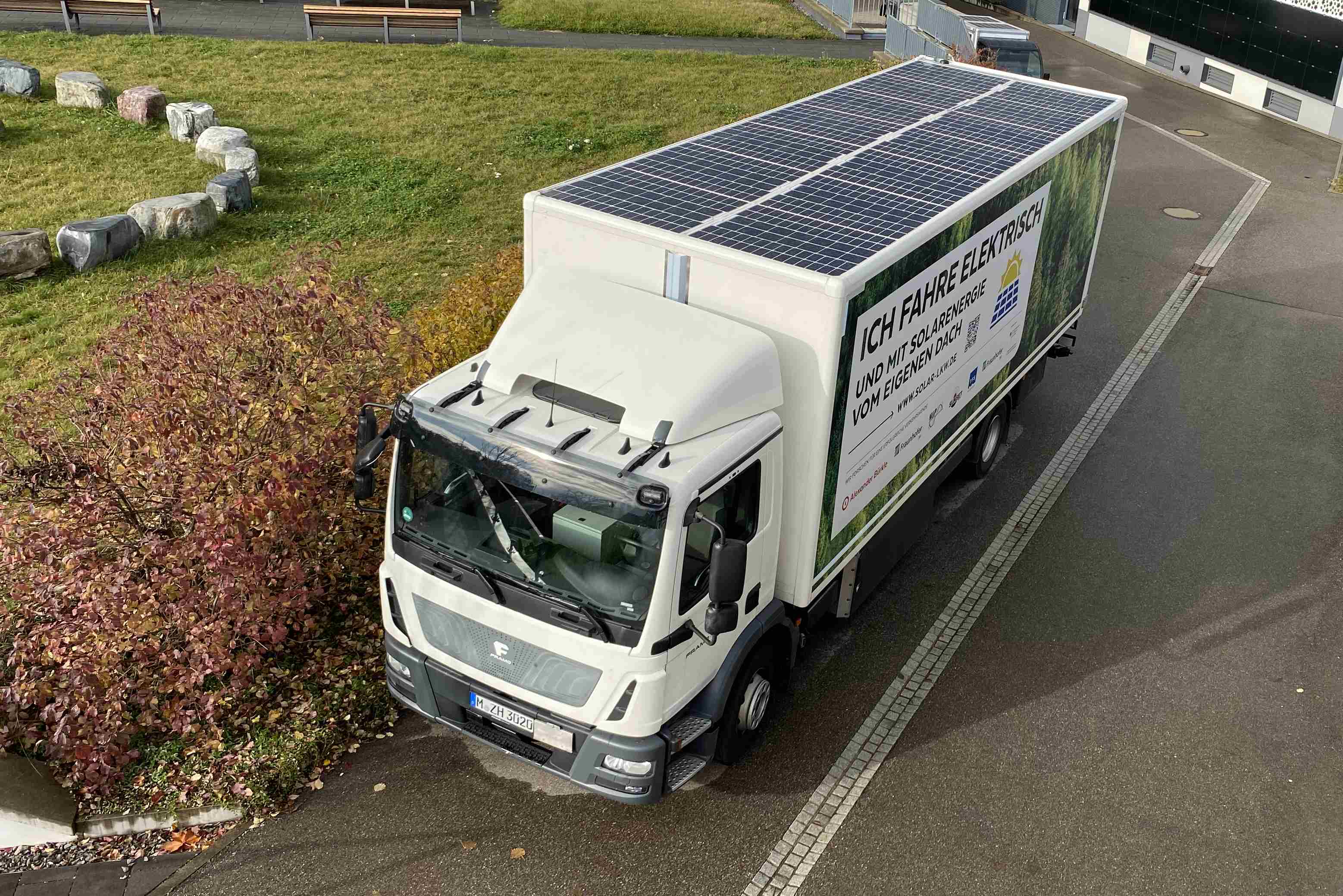News #8
Electric Truck with Integrated Photovoltaics Passes Practical Test Phase
Vehicle-integrated photovoltaics (VIPV) is an elegant way to harvest solar power independent of the grid and to simultaneously reduce CO2 emissions, especially for electric vehicles. In the Lade-PV research project, the Fraunhofer Institute for Solar Energy Systems ISE worked with industrial partners to develop a high-voltage photovoltaic (PV) system and integrate it into the roof of an electric truck. The Fraunhofer Institute for Transportation and Infrastructure Systems IVI created a digital twin to carry out comprehensive energy forecasts of the PV-integrated truck. After 12 months in operation for the logistics company Alexander Bürkle GmbH, it is now clear that the 18-ton truck and its 3.2 kilowatt-peak photovoltaic system have passed the practical test.
The electric heavy-duty truck with integrated high-voltage photovoltaics and feed-in to the 800-volt traction battery has been approved for road traffic by TÜV and DEKRA. For Alexander Bürkle GmbH, the electric truck was in use for one year in the Freiburg area and was regularly checked to measure the electricity yields and monitor the components under real conditions. "We are pleased that the PV system design proved to be so reliable," says Marc Andre Schüler, project manager at Fraunhofer ISE. "The lightweight PV modules combined with highly compact power electronics are particularly suitable for heavy-duty freight transport, where every saved kilogram helps to reduce power consumption and maintain the payload."
Testing under Real Conditions
Calculations by the Fraunhofer IVI using its energy forecast model "IVImon" estimated that the solar power produced on the vehicle would cover up to 25 percent of the truck's energy requirements on summer days and up to 13 percent on an annual average. This forecast could be verified by a reference measurement on the e-truck, at which time the charging behavior was optimized accordingly. "In order to get the maximum use of the PV system, it was important to charge the battery externally only during the evening hours. The vehicle was first allowed to charge up on solar energy," says Stephan Möllinger, Head of Decentralized Logistics at Bürkle GmbH.
The particularly lightweight and robust PV module prototypes, developed by Fraunhofer ISE, were constructed by Sunset Energietechnik GmbH. The solar modules were integrated by TBV Kühlfahrzeuge GmbH into the container body of the Framo electric truck, which served as the first demonstrator vehicle. As the PV modules, the power electronics were adapted to meet the requirements of the heavy-duty vehicle. The project partner M&P Motion Control and Power Electronics GmbH developed a DC power controller that communicates with the vehicle control system via CAN bus and is integrated into the vehicle's safety concept. The photovoltaic power generated on the roof is fed directly into the truck's on-board power supply.
Safe Power Management Achieved Due to Special Separation Device
To ensure that electricity yields are high, but material and cabling costs remain low, the solar modules in the truck roof are connected in series. The resulting high voltages of up to 400 volts could pose a safety risk in the event of an accident. To prevent this risk, Fraunhofer ISE developed a separation device, which is located in the junction box of each PV module. In the event of an accident, the device disconnects the power within milliseconds so that only harmless, low protective voltages are present in the system.
Detailed results on the truck operation from the monitoring phase will be presented today at the PVinMotion conference, an international event for vehicle-integrated photovoltaics held online and in presence from February 15-17 in 's-Hertogenbosch, the Netherlands. For more information, please visit the conference website at www.pvinmotion-conference.com

Downloads and Links
Last modified: